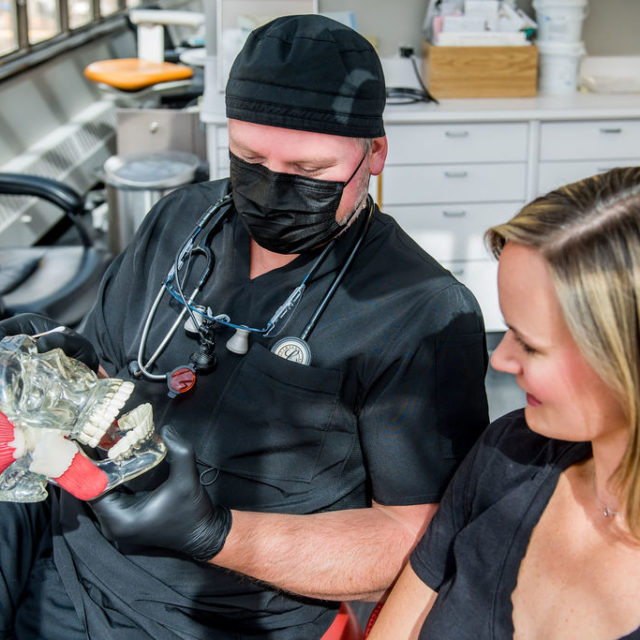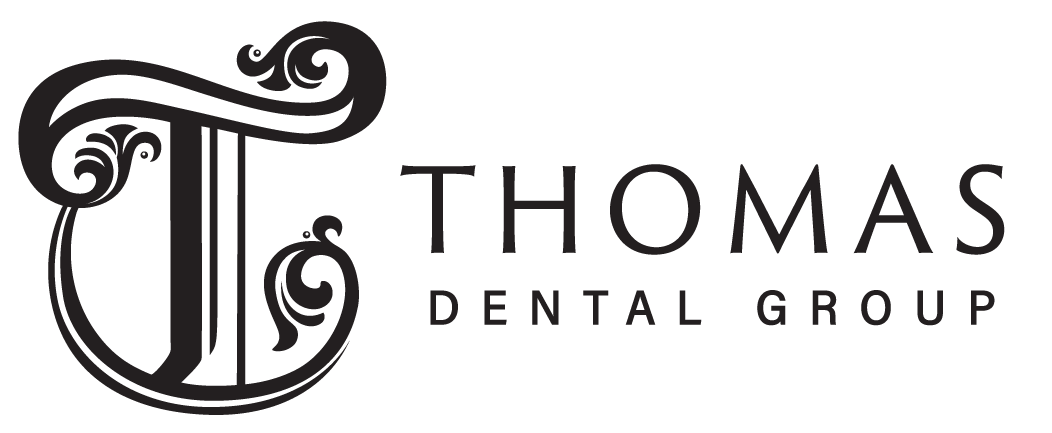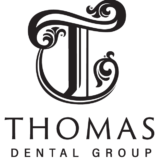TMD Services
At Thomas Dental, we deliver personalized care for TMJ disorders to alleviate your symptoms and improve your quality of life. With our advanced diagnostic techniques and expertise, we provide precise and effective diagnosis and treatment for your TMD concerns. Our goal is to work closely with you to develop a customized treatment plan that caters to your unique needs, offering lasting relief from TMD.

What is temporomandibular disorder?
If you’ve ever experienced pain or discomfort in your jaw, you may be suffering from TMJ or TMD. TMJ or TMD refers to a condition that affects the temporomandibular joint, which is the joint that connects your jawbone to your skull. This joint is responsible for the movements of your jaw, such as talking, chewing, and yawning. When something goes wrong with this joint or the surrounding muscles, it can cause discomfort or pain in the jaw and even impact your posture and hearing.
What are the symptoms of TMD?
Symptoms of TMJ or TMD can vary from person to person, and can include:
- Pain or tenderness in the jaw, face, or neck
- Difficulty opening or closing the mouth
- Clicking, popping, or grinding sounds when opening or closing the mouth
- Headaches or earaches
- Pain or pressure behind the eyes
- Facial swelling
- Aching in and around the ear
- Dizziness or vertigo
- Teeth sensitivity
- Jaw locking or getting stuck in an open or closed position

What causes TMD?
Temporomandibular disorder can be caused by a variety of factors, including teeth grinding, injuries, arthritis, or a misaligned bite. One of the most common causes is teeth grinding, which puts a lot of pressure on the jaw joint and surrounding muscles. Injuries to the jaw or face can also lead to TMD, as can arthritis and other inflammatory conditions. Sometimes, a misaligned bite or teeth can contribute to TMD. Stress is also believed to play a role in the development of TMD, as it can cause people to clench their jaw or grind their teeth unconsciously. It’s important to identify the underlying cause of TMD in order to provide effective treatment and prevent the condition from worsening.
How is TMJ / TMD diagnosed?
To diagnose TMD, our team at Thomas Dental will perform a thorough examination that includes taking a medical history, checking your jaw joints and bite, and testing your jaw movements and posture. We may also use special tests like X-rays or computerized tracking to help identify any issues.
• Evaluation of temporomandibular
joints
• Evaluation of occlusion of teeth
• Evaluation of the movements of the
jaw
• Evaluation of posture
• Bite registration
• Diagnostic imaging
• Computerized Mandibular Scan (CMS)
• Electromyography (EMG)
• Sonography (EMG)
• Computerized jaw tracking
• Musculoskeletal assessment
What treatments are available for TMD?
At Thomas Dental, we understand that every patient is unique and has individual needs when it comes to TMJ disorders. That’s why we provide personalized care tailored to your specific situation. Our process begins with a clinical evaluation to determine the underlying cause of your TMJ/TMD symptoms. Based on the results, we’ll recommend the most appropriate course of action to address your condition. Here’s a brief overview of TMD management and treatment options.
TMD Management & Treatment Options
Palliative treatment focuses on providing relief from the symptoms of TMD, such as pain and discomfort. This type of treatment may include thermal therapy, TENS therapy (Transcutaneous Electrical Neural Stimulation), physical therapy or massage, and medicinal therapy.
This type of treatment may include orthotic or myofunctional therapy, trigger point injections, and neuromodulator therapy
Permanent treatment for TMD is typically more definitive and long-lasting, and may include reconstruction of teeth (crowns/bridges), orthodontics, dentures, and permanent splint appliance therapy.
Surgical intervention may be necessary in severe cases of TMD that do not respond to other treatments. This type of treatment may include surgical intervention for severe traumatic injury to the TMJ, as well as other surgical procedures to repair or replace damaged tissue in the joint.
TMD Services We Offer
Jaw Tracking, Sonography, and Electromyography (EMG) using the K7® Evaluation System
Neuromodulator Therapy
In House CBCT Tomography
Custom Splint Therapy
Medical/Legal Assessment and Reporting
Other Services at Thomas Dental
General Dental Services
Keep your teeth healthy with our range of general dental services, including routine check-ups, cleanings, fillings, and preventative measures.
Cosmetic Dental Services
Enhance your smile with our teeth whitening, veneers, cosmetic bonding, and full-mouth reconstruction solutions.
Restorative Dental Services
Regain your dental health and function with our restorative treatments, including crowns, bridges, implants, and dentures, designed to repair and replace damaged or missing teeth.


